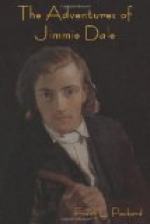“The car is ready as soon as you are dressed,” announced the other briefly. He laid the clothes upon the couch—and settled himself significantly in a chair.
Jimmie Dale hesitated. Then, with a shrug of his shoulders, recrossed the room, and began to remove his torn garments. What was the use! They would certainly have their own way in the end. It wasn’t worth another fight, and there was nothing to be gained by a refusal except to offer a sop to his own exasperation.
He dressed quickly, in what proved to be an exceedingly well-fitting suit; and finally turned tentatively to the man in the chair.
The other stood up, and produced a heavy black silk scarf.
“If you have no objections,” he said curtly, “I’ll tie this over your eyes.”
Again Jimmie Dale shrugged his shoulders.
“I am glad enough to get out on any conditions,” he answered caustically.
“‘Fortunate’ would be the better word,” rejoined the other meaningly—and, deftly knotting the scarf, led Jimmie Dale blindfolded from the room.
CHAPTER V
ON GUARD
Was he in the city? In a suburban town? On a country road? It seemed childishly absurd that he could not at least differentiate to that extent; and yet, from the moment he had been placed in the automobile in which he now found himself, he was forced to admit that he could not tell. He had started out with the belief that, knowing New York and its surroundings as minutely as he knew them, it would be impossible, do what they would to prevent it, that at the end of the journey he should be without a clew, and a very good clew at that, to the location of what he now called, appropriately enough it seemed, the Crime Club.
But he had never ridden blindfolded in a car before! He could see absolutely nothing. And if that increased or accentuated his sense of hearing, it helped little—the roar of the racing car beat upon his eardrums the more heavily, that was all. He could tell, of course, the nature of the roadbed. They were running on an asphalt road, that was obvious enough; but city streets and suburban streets and hundreds of miles of country road around New York were of asphalt!
Traffic? He was quite sure, for he had strained his ears in an effort to detect it, that there was little or no traffic; but then, it must be one or two o’clock in the morning, and at that hour the city streets, certainly those that would be chosen by these men, would be quite as deserted as any country road! And as for a sense of direction, he had none whatever—even if the car had not been persistently swerving and changing its course every little while. If he had been able to form even an approximate idea of the compass direction in which they had started, he might possibly have been able in a general way to counteract this further effort of theirs to confuse him; but without the initial direction he was essentially befogged.




